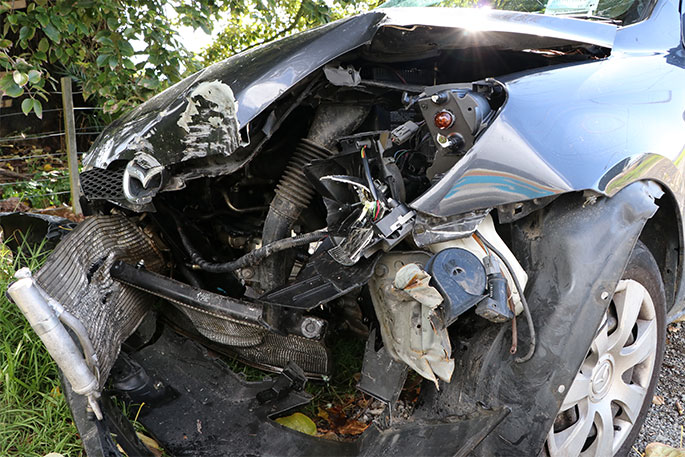An average of four people are injured every hour on New Zealand roads over the Queen's Birthday long weekend, at a cost of almost $2 million per year.
That's according to new figures from ACC, which show an average of almost 400 people lodged a road injury claim during the past five Queen's Birthday weekends – taking in the four-day period from Friday to Monday – at a total cost of almost $10m.
With this year's Queen's Birthday weekend from June 4-6 set to be followed by the inaugural Matariki long weekend from June 24-26, ACC injury prevention leader James Whitaker is urging drivers to be aware of the risks before they hit the road for the holidays.
'Please, have a ‘hmmm' before you go so that you and everyone else can be safe.”
New Zealand is coming off an horrific recent holiday period, in which a combined 15 people died on the country's roads over the Easter and Anzac Day weekends.
More than 176,000 road-related injury claims were lodged in total between 2017 and 2021, with active claims costs in that time totalling $2.45 billion.
These costs reached a five-year high last year of $536m.
ACC is one of several agencies involved in the Government's Road to Zero campaign, which sets a target of reducing annual road-related deaths and serious injuries by 40 per cent by 2030.
James has experienced first-hand the trauma of preventable road-related accidents. A few days after he was born, his father, 23, was changing a tyre on the side of the road when he was struck and killed by a drunk driver.
James was involved in a crash himself as a young man after driving too fast for the conditions on a rural road. His car was written off but he luckily avoided serious injury.
Then just a few years ago, Jame's young daughter suffered a neck injury and broken wrist when a 20-year-old driver failed to give way at an intersection.
James says one of the simplest things people can do to stay safe is keep a following distance of at least two seconds on the open road.
'If the car in front of you suddenly stops or slows right down, how close are you to that vehicle?”
Drivers should also be aware of wintery conditions over the upcoming holiday periods, and consider delaying their journey if the weather looks bad, James says.
AA road safety spokesman Dylan Thomsen says as well as keeping a safe following distance - at least two seconds in good conditions and longer if wet, drivers should stay focussed and avoid distractions such as using cell phones.
They should drive at a speed that is safe for the conditions, always turn on headlights so they are more visible to other drivers, and take regular breaks to stay fresh and alert.
Drivers should also be aware of sunstrike in the morning and late afternoon, Dylan says.
'Go with the flow when traffic is heavy and avoid trying to overtake as it won't get you much further ahead.
'If you are towing or going slower than others, look for places where you can pull over and let people behind you pass safely.”
James says everyone needs to play their part to ensure the safety of all road users over the holiday periods.
'It takes everyone to get to no one.”
ACC's involvement in Road to Zero
ACC runs Drive, an online learning tool for young drivers, and the Ride Forever coaching programme for motorcyclists.
Young drivers (aged 16 to 24) make up just 13 per cent of licence holders but represent 30 per cent of serious injuries and 26 per cent of deaths.
Data shows young drivers who have used the Drive programme as part of the licensing process make about 40 per cent fewer ACC claims than those who have not used the programme.
Motorcyclists are also at higher risk on the road, with the likelihood of death or serious injury 21 times higher than a car driver travelling over the same distance.
Data shows riders who have completed a Ride Forever coaching course are up to 50 per cent less likely to lodge a motorcycle accident claim than non-trained riders.
ACC Road-related injury claims
Past five years (1 January 2017 – 31 December 2021)
- 176,408 total claims
- Total active claims cost: $2.45 billion
Past five Queen's Birthday weekends (Friday-Monday)
- 1,980 total claims
- Total cost of these claims to date: $9.9 million



1 comment
Distance.
Posted on 04-06-2022 18:09 | By morepork
You could sum up the primary requirement in the following simple rule: "NEVER drive so fast that you CANNOT stop, well WITHIN THE DISTANCE you can SEE TO BE CLEAR." All of the details about urban and country driving can be linked back to this. For example, don't overtake approaching the crest of a rise or a bend in the road. Why not? Because you can't stop within the clear distance you have throughout the manouevre (which changes once you commit to it...). Good driving is really just common sense, but there seems to be a sad lack of it on our roads. Obviously, allow mind altering substances or powerful emotions like anger into the mix, and, suddenly, your family car has become a lethal weapon. Defensive driving courses should be easily available and within reach of everyone.
Leave a Comment
You must be logged in to make a comment.